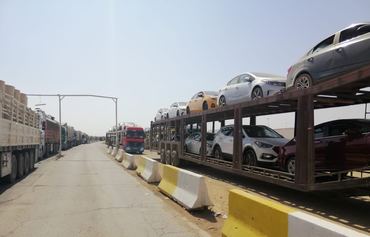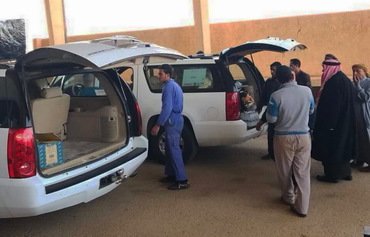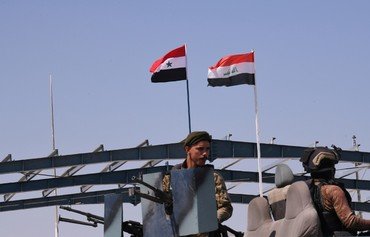The planned reopening of Iraq's al-Qaim border crossing with Syria after more than three years is expected to revive the area's social and trade relationships, local officials told Diyaruna.
Iraqi Prime Minister Haider al-Abbadi discussed "co-ordinating efforts" to reopen the border crossing in western Anbar province during a meeting with a Syrian government delegation on February 7th.
Minister of Interior Qassim al-Araji on February 12th confirmed that al-Abbadi had given his permission to open the crossing.
If this goes ahead as planned, officials said, it will be an important win for Iraq, which has been struggling to improve the economic outlook in cities liberated from the "Islamic State of Iraq and Syria" (ISIS).
These cities suffered losses due to the closure of the crossing for more than three years, after ISIS overran swathes of northern Iraq in June 2014.
Crossing was left in ruins
Iraqi forces found nothing but rubble when they entered the Anbar border town of al-Qaim, gaining control of the crossing with Syria on November 3rd.
ISIS had leveled the buildings, and the crossing had become a deserted area, al-Qaim mayor Ahmed al-Dulaimi told Diyaruna.
After ISIS entered Iraq from Syria, he said, it destroyed local police stations, crossings and border signs so it could declare its so-called state.
Rebuilding the crossing will be "a huge challenge" for the government since it requires full reconstruction, al-Dulaimi said, which will take a long time and will require significant funds.
"As a temporary measure, prefabricated structures have been installed until reconstruction is completed and the crossing becomes fully operational rather than [operating] on an emergency basis," he said.
The crossing served as a commercially active hub before ISIS entered the scene, he added, noting that its reopening would be a significant gain for the economy of Anbar and of Iraq in general.
Restoring a commercial lifeline
The movement of people and goods between Iraq and Syria occurs through the city of al-Qaim on the Iraqi side and the city of Albu Kamal on the Syrian side.
Before the ISIS incursion, the annual commercial turnover was estimated at five billion dollars. But following the start of the Syrian war in 2011, this figure declined, and when ISIS emerged, commercial activity came to a standstill.
Al-Qaim crossing is a second lifeline for Anbar, after the Trebil crossing with Jordan, Anbar province spokesman Eid Ammash told Diyaruna.
The resumption of cross-border commercial activity will help to support reconstruction efforts and development in the province and will in turn boost employment, he said.
The reopening of the crossing also will help streamline travel and communication for local residents, he said, noting that tribes in western Anbar have blood relations with tribes in Albu Kamal and Deir Ezzor on the Syrian side.
Rebuilding the border crossing will be a complicated task, he warned, since ISIS destroyed the crossing's infrastructure in an attempt to redefine the border according to its own ideology.
Need for vigilance at border
The other challenge will be the security situation, Ammash said.
"We are worried about that," he said. "We have secured the border from our side, but things are still unstable on the Syrian side."
ISIS still has a presence in parts of Syria along the northern Euphrates, he said, adding that the group launches sporadic mortar attacks on border towns.
Members of al-Qaim-based Albu Mahal tribe played an active role in the liberation of their territory from ISIS, said tribal leader Sabah al-Mahalawi.
"We are even better prepared to support the government if they plan on reopening al-Qaim crossing," he told Diyaruna. "We are ready to support the security forces and help them protect the crossing and the trade route."
"We hope the government takes steps to rebuild and reopen the crossing soonest, since it is a vital crossing and has significant economic value," he added.

![Prime Minister Haider al-Abadi joins military officials to raise the Iraqi flag at al-Qaim border crossing in Anbar, after it was retaken from the 'Islamic State of Iraq and Syria' in this photo, posted online on November 5th. [Photo courtesy of the press office of the Iraqi Prime Minister]](/cnmi_di/images/2018/02/28/11535-iraq-qaim-reopen-600_384.jpg)






